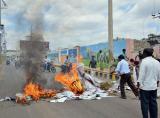 Congress also accused YSR Congress leader Y S Jaganmohan Reddy as also TDP chief N Chandrababu Naidu of playing politics on the issue by opposing a separate Telangana now after coming out with unqualified support earlier.
Congress also accused YSR Congress leader Y S Jaganmohan Reddy as also TDP chief N Chandrababu Naidu of playing politics on the issue by opposing a separate Telangana now after coming out with unqualified support earlier.
"Such time has not come, we will think about it when the situation arises," Congress spokesman Bhakt Charan Das told reporters to questions on the possibility of imposition of President's rule in the state.
A senior Congress leader, who declined to be identified, suggested that there could be no other alternative than central rule if the situation worsened in Andhra Pradesh.
The refrain of the Congress spokesman was that the opposition by Jaganmohan and Naidu was an "after thought" as the two parties have been on board on the decision for formation of separate Telangana.
He also read out the letters and resolutions of the two parties in favour of separate Telangana.
"There was no agitation (against Telangana). There has not been resentment in the past. This is all after thought. All political," he said seeking to expose the two Andhra parties.
Naidu today started an indefinite fast here while the one by Jaganmohan in Andhra Pradesh entered its third day.
Das skirted questions on the fate of Chief Minister Kiran Kumar Reddy, his controversial statements and as to how he could continue in the post when he was against bifurcation of the state. He said it was an internal matter and leaders of his party would look into it.To a query, he said a resolution of the Andhra Pradesh Assembly for the bifurcation of the state was "not warranted".
Noting that the movement for separate Telangana was on for decades, he insisted that there has been "silent support" from people of the nation to the issue because of the backwardness of the region and regional imbalance.





Comments
Add new comment